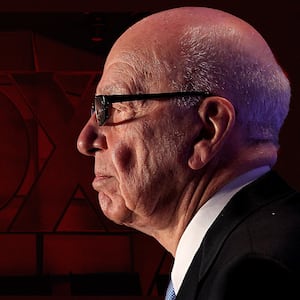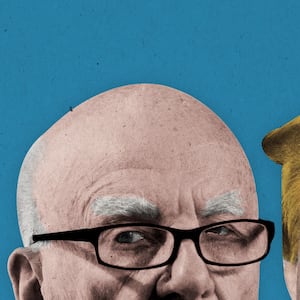In 2005, Rupert Murdoch’s British Sunday tabloid, the News of the World, was voted National Newspaper of the Year. At the time, many journalists, including me, likened the award to anointing Sweeney Todd as Barber of the Year.
But the Society of Editors, which made the choice, said they were swayed by the sheer number of scoops delivered by the paper’s newsroom.
There was certainly a titillating cascade of scandals: a cabinet minister sharing a mistress, a married American publisher, with a left-wing journalist; the charismatic young soccer star David Beckham betraying his wife by sleeping with his personal assistant; the manager of the England soccer team likewise with a secretary at the Football Association.
As with so many aspects of British life, the controversy provoked by the award had a whiff of class divisions. The national newspaper market had always been finely stratified according to the perceived classes of its readers. At the top were serious broadsheets, like The Times, The Guardian and the Financial Times. At the bottom were the carnivorous red-top tabloids, including the News of the World.
To Murdoch and the paper’s editor, Andy Coulson, the controversial award confirmed one of their shared beliefs about British journalism, that the professional elite had both a liberal bias and an innate sense of superiority. They rejoiced that, for once, the toffs had been beaten out by the barbarians. The judges had recognized what the British public really enjoyed, seeing the great and the good with their trousers down.
That mission, to strip elitism of its pretensions and grip on society, lay at the root of Murdoch’s global rise as a newspaper magnate. It remains manifest today in his almost pathological pleasure in fomenting divisions of class, race and political beliefs, as he did by supporting Brexit and, even more avidly, Trumpism.
But, as it turned out, the News of the World’s astonishing tally of scoops was the product of electronic larceny, of what emerged as the single most shaming and disreputable corruption of journalistic ethics in British history. Every story had been obtained by hacking into the voicemail of cellphones.
The practice had started quietly at the sui generis Murdoch daily tabloid, The Sun, in 1998. And, poignantly, it involved Murdoch’s current wife, Jerry Hall. In 1999, the breakup of her marriage with Mick Jagger was followed in increasingly intimate detail in a run of well-sourced stories in the Sun, all based on hacking.
Once unlocked by a single reporter in the Sun newsroom (his identity has never been disclosed), the vulnerability of voice mails was too tempting to resist. Soon, as one reporter told Nick Davies, the Guardian reporter who eventually exposed the racket, “everyone was at it.”
The rest is history, the great hacking scandal that, when it was revealed, forced Murdoch, for the first time, to face British lawmakers in 2011 and apologize for the industrial scale perversion of journalism that metastasized through the newsrooms of the Sun, the News of the World, and other London tabloids.
But Murdoch had left no personal fingerprints.
Coulson, however, was jailed for 18 months on charges of conspiracy to intercept voice mails. Rebekah Brooks, his one time lover, who edited both of the Murdoch tabloids and then oversaw them as chief executive, was acquitted of charges of perverting the course of justice. The News of the World, once the world’s largest selling paper, was closed, an act of penitence by Murdoch, somewhat softened when it was reincarnated as the Sun on Sunday.
And there it seemed to rest. There was never any doubt that Murdoch himself had created the shark-tank culture of his newsrooms, and had been abetted in that by Brooks, but neither of them suffered any lasting reputational harm. Today, Brooks is chief executive of News Group Newspapers, the corporate owner of Murdoch’s London tabloids.
Conventional wisdom was that two people who, in the words of John Lloyd, a co-founder of the Reuters Institute for the Study of Journalism at the University of Oxford, spearheaded an operation that “left a great scar on civic life in Britain” had, in the long term, no cause to lose any sleep over it.
Not so much.
It’s now clear that the costs of the hacking scandal have delivered a near-mortal blow to the Sun at a time when that paper, the incubator of his empire, no longer has a business model that was viable.
The latest financial results for News Group Newspapers disclosed that Murdoch has been forced to write down the value of the Sun tabloids to zero. In 2020 they lost £201 million ($280 million). The largest single factor in that loss was £88.7 million in legal costs including payments to victims of the hacking scandal. That was on top of the £400 million already paid out. (The Daily Mirror, a rival tabloid, has paid out north of £75 million.)
In fact, the scandal has created a minor but lucrative industry for London lawyers as the cases have crawled through the courts—only £52 million of the £88.7 million that left the Murdoch coffers actually ended up with the victims. (One of the litigants is Prince Harry, who filed claims alleging “illegal interception of voicemail messages” against both the Murdoch and Mirror tabloids in September 2019.)
News Group no longer discloses the Sun’s daily circulation. At its peak it was selling nearly five million copies a day. By the early 1980s the London papers were generating annual profits of more than £34.5 million.
Alongside being hit by the costs of the hacking scandal The Sun has been unable to find a remedy for the rapid decline in the tabloid market. Print has been rendered redundant by the fire hose velocity of celebrity scandal coverage on social media, delivered in a far more compelling form. (Murdoch’s top end papers, the Times and Sunday Times in London, and the Wall Street Journal in New York, have successfully made the change to digital through the paywall subscription model.)
The financial impact of the collapse of Murdoch’s tabloids is clearly one of the reasons why he suddenly pulled the plug on News UK TV, intended to be a British clone of Fox News. The studios had been built and key staff recruited when Brooks, wielding the ax, said, “the payback for our shareholders wouldn’t be sufficient.”
The wisdom of that judgment has since been reinforced by the debut of a similar venture in London, GB News, a fiasco that, within days, was losing key advertisers.
And then, just as all this was happening, another dark and odious episode from the past of the News of the World came back to remind the world of the editorial legacy of Murdoch and Brooks. To be fair, the stink of it actually extends beyond the Murdoch tabloids and indicts a long-established subculture of London journalism.
In 1987, a private gumshoe, 37-year-old Daniel Morgan, was found dead with an ax buried in his head in the parking lot of a south London pub. His murder has never been solved.
South London has a history of neighborhoods under mob rule, much of it involving drugs and a particularly vicious code of retribution for perceived disloyalty. At some point that racket came to include a number of the people supposed to be policing it, serving in the Metropolitan Police, by far Britain’s largest police force, headed by Scotland Yard.
As The Daily Beast has reported, an independent investigation into Morgan’s murder has just revealed in damning detail how the investigation into the killing was persistently compromised by “a form of institutional corruption.”
But there was a third arm of this conspiracy, a clique of journalists. As Murdoch himself correctly pointed out (and as I know from my own experience) many London dailies had for decades routinely bribed cops to supply them with tips. But when a News of the World executive, a mysterious Ukrainian named Alex Marunchak, negotiated his way into the south London swamp, the tips were of an entirely different order.
In his book Hack Attack, the Guardian reporter Nick Davies recounts how the paper, usually tight-fisted with expenses, gave Marunchak an open-ended budget to feed bent cops who, in turn, were relaying intelligence both from the files of Scotland Yard and the criminal gangs. As a result, multiple sources on targets as diverse as rock stars, politicians and the Royal Family fed the News of the World with scoop after scoop. In one year, 1996, the paper paid around £200,000 for tips from this network.
Daniel Morgan is widely assumed to have been killed on the orders of a mob chief after stumbling on to the true extent of the conspiracy. Whatever the truth of this very cold case is, it serves as a chilling reminder of just how steep and iniquitous the rush to the bottom was among the London tabloids, and how far that was driven by the moral squalor of the Murdoch newsrooms.
This lack of scruple remains.
Fox News is for Murdoch now what the tabloids were 40 years ago, a profit gusher that keeps his business prosperous. The latest quarterly numbers for Fox show revenues at $3.22 billion, and growing. Furthermore, the New York Post has become a profitable part of the Murdoch empire, especially as it joins Fox in laundering Murdoch’s preferred political agenda.
In the post-election anarchy it briefly seemed that the Fox audience would be drawn to the more wing-nut channels, Newsmax and One America News, but that did not happen, as Fox reasserted its fealty to believers in The Big Lie. That maneuver has been adroitly orchestrated with the help of Tucker Carlson, who tops cable-news primetime ratings with an average nightly viewership of 2.94 million.
And the reach of the pernicious Fox News megaphone is growing, through streaming and podcasts. Carlson, for example, powers up Fox’s streaming service, Fox Nation, as he appears to be positioning himself as a George Wallace for the 21st century, peddling genetic white supremacy. That deliberately opens up clear space between him and Sean Hannity, who runs second as he remains the obtuse Trump ventriloquist.
More and more, Murdoch looks like being a willing accomplice and enabler in a slow-motion Republican coup d’état. That’s a far more dangerous game than any he has played before, but it’s the only one he’s left with.
This time, unlike the hacking scandal, will he be held accountable for the monster that he created?








